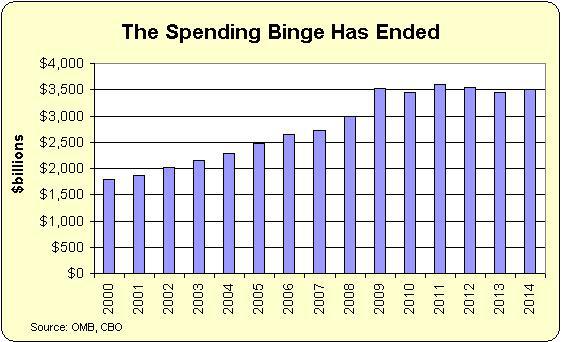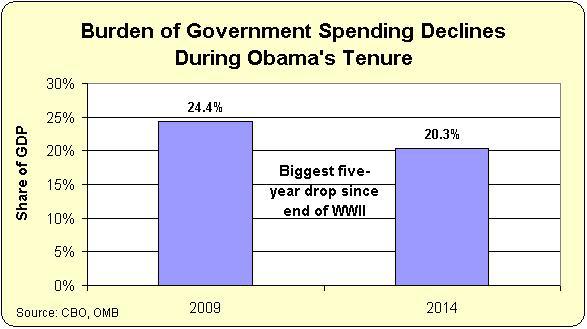

Liberal-progressive, left-wing economist Paul Krugman is actually paid $25,000 per month to talk, write, research and harp about “income inequality.”
I don’t know whether to be impressed or horrified by Paul Krugman. I’m impressed that he’s always “on message.” No matter what’s happening in America or around the world, he always has some sort of story about why events show the need for bigger government.
But I’m horrified that he’s so sloppy with numbers.
My all-time favorite example of his fact-challenged approach deals with Estonia. In an attempt to condemn market-based fiscal policy, he blamed that nation’s 2008 recession on spending cuts that took place in 2009.
Wow. That’s like saying that a rooster’s crowing causes yesterday’s sunrise. Amazing.
Let’s look at a new example. This is some of what he recently wrote while trying to explain why the U.S. has out-performed Europe.
America has yet to achieve a full recovery from the effects of the 2008 financial crisis. Still, it seems fair to say that we’ve made up much, though by no means all, of the lost ground. But you can’t say the same about the eurozone, where real G.D.P. per capita is still lower than it was in 2007, and 10 percent or more below where it was supposed to be by now. This is worse than Europe’s track record during the 1930s. Why has Europe done so badly?
Krugman answers his own question by saying that the United States has been more loyal to Keynesian economics.
…what stands out from around 2010 onward is the huge divergence in thinking that emerged between the United States and Europe. In America, the White House and the Federal Reserve mainly stayed faithful to standard Keynesian economics. The Obama administration wasted a lot of time and effort pursuing a so-called Grand Bargain on the budget, but it continued to believe in the textbook proposition that deficit spending is actually a good thing in a depressed economy.
I have to confess that alarm bells went off in my head when I read this passage.
If Krugman was talking about the two years between 2008 and 2010, he would be right about “staying faithful to standard Keynesian economics.”
But 2010 was actually the turning point when fiscal policy in America moved very much in an anti-Keynesian direction.
Here’s the remarkable set of charts showing this reversal. First, there was zero spending growth in Washington after 2009.

Federal Spending from 2000 to the present. (Source: Dan Mitchell)
Second, this modest bit of fiscal restraint meant a big reduction in the burden of government spending relative to economic output.

Federal Spending from start of Obama administration to the present. (Source: Dan Mitchell)
Wow, if this is Keynesian economics, then I’m changing my name to John Maynard Mitchell!
So is Krugman hallucinating? Why is he claiming that U.S. policy was Keynesian?
Let’s bend over backwards to be fair and try to find some rationale for his assertions. Remember, he is making a point about U.S. performance vs. European performance.
So maybe if we dig through the data and find that European nations were even more fiscally conservative starting in 2010, then there will be some way of defending Krugman’s claim.
Yet I looked at the IMF’s world economic outlook database and I crunched the numbers for government spending in the biggest EU economies (Germany, UK, France, Italy, Spain, Netherlands, Sweden, Belgium, accounting for almost 80 percent of the bloc’s GDP).
And what did I find?
Contrary to Krugman’s claims, total government spending in those nations grew slightly faster than it did in the United States between 2009 and 2014.
So on what basis can Krugman argue that the U.S. had a more Keynesian approach?
Beats the heck out of me. I even looked at the OECD data on deficits to see whether there was some way of justifying his argument, but those numbers show the biggest reduction in red ink (presumably a bad thing according to Keynesian stimulus theory) took place in the United States.
But I will close by acknowledging that Krugman’s column isn’t just focused on fiscal policy. He also argues that the Federal Reserve has been more Keynesian than European central banks. My impression is that both the Fed and the ECB have been keeping interest rates artificially low, so I’m not sure that’s an effective argument (or an effective policy!), but I’ll leave that issue to the folks who specialize in monetary policy.
P.S. If you want additional examples of Krugman’s factual errors, see here, here, here, here, here, here, here, here, here, and here.
[mybooktable book=”global-tax-revolution-the-rise-of-tax-competition-and-the-battle-to-defend-it” display=”summary” buybutton_shadowbox=”true”]






